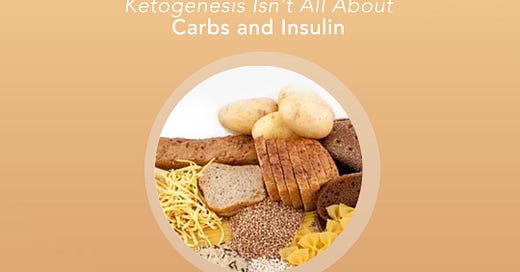017: Ketogenesis Isn’t All About Carbs and Insulin
Mastering Nutrition Episode 17
Introduction
Did you know that adding MCT oil to your pasta is more ketogenic than restricting your carbohydrates to ten percent of calories?
Many people think of carbohydrate and insulin as central to ketogenesis, but the direct biochemical event that initiates ketone formation is actually the oversupply of acetyl groups to the TCA cycle during conditions of oxaloacetate depletion.
While largely a biochemistry lesson, in this episode I also teach you the practical implications of this. There is more than one route to ketogenesis, and while they all produce ketones, they are fundamentally different in important ways.
Adding coconut, MCT oil, or exogenous ketones allows you to reap benefits of ketones without necessarily restricting carbohydrates and insulin, and that may be useful if you are also trying to reap some of the benefits of carbohydrate and insulin.
On the other hand, certain conditions that respond to ketogenic diets, for example refractory childhood epilepsy, need stronger degrees of ketogenesis than you can achieve simply by adding MCT oil to pasta.
Understanding the difference allows you to better make practical decisions about your diet that are most consistent with your priorities.
Watch the Video
Watch the YouTube video below:
Ketogenic Diets Aren't All About Carbs and Insulin
Show Notes
Did you know that adding MCT oil to your pasta is more ketogenic than restricting your carbohydrates to ten percent of calories?
Many people think of carbohydrate and insulin as central to ketogenesis, but the direct biochemical event that initiates ketone formation is actually the oversupply of acetyl groups to the TCA cycle during conditions of oxaloacetate depletion.
While largely a biochemistry lesson, in this episode I also teach you the practical implications of this. There is more than one route to ketogenesis, and while they all produce ketones, they are fundamentally different in important ways.
Adding coconut, MCT oil, or exogenous ketones allows you to reap benefits of ketones without necessarily restricting carbohydrates and insulin, and that may be useful if you are also trying to reap some of the benefits of carbohydrate and insulin.
On the other hand, certain conditions that respond to ketogenic diets, for example refractory childhood epilepsy, need stronger degrees of ketogenesis than you can achieve simply by adding MCT oil to pasta.
Understanding the difference allows you to better make practical decisions about your diet that are most consistent with your priorities.
In this episode, you’ll find all of the following and more (these times refer to the podcast, and they may be different in the YouTube video):
01:00 An announcement about the paleo event I am speaking at in Brooklyn on August 9th.
03:17 The cliff notes.
04:55 The Snapchat discussion that inspired this episode.
05:44 Why the idea that protein suppresses ketogenesis by forming glucose makes no sense.
12:01 Overview of TCA Cycle and burning carbohydrate for energy.
14:48 How we burn fat on a mixed diet.
15:44 The meaning of the phrase, “fat burns in the flame of carbohydrate.”
17:58 Loss of lean muscle mass can occur if dietary carbohydrate and protein are too low; neither fat nor ketones can spare muscle mass from this effect.
22:20 Under carbohydrate restriction, oxaloacetate (OAA) is not repleted by carbohydrate and is used for gluconeogenesis, while more fatty acids reach the liver to make acetyl CoA.
24:38 The oversupply of acetyl groups in excess of OAA initiates ketogenesis.
26:40 Insulin shifts fat to adipose tissue, but this doesn’t cause obesity.
28:00 The effect of insulin allows us to look at how medium-chain and long-chain fats differ.
29:41 MCTs go straight to the liver and avoid effect of insulin in the blood.
30:26 Insulin suppresses the carnitine shuttle, but only long-chain fatty acids require it.
33:12 MCTs at breakfast suppress food intake at lunch.
35:14 Pasta topped in tomato sauce and MCT oil increases beta-hydroxybutyrate.
39:05 Two ways of getting ketones: selective deprivation vs. abundance.
42:12 If you are trying to get ketones, but having negative effects of carbohydrate restriction, you can add MCTs (or exogenous ketones) to get the ketones without carbohydrate restriction.
43:45 MCT oil-topped pasta is more ketogenic than a 10% carb diet, but much less ketogenic than the diets used to treat refractory epilepsy.
46:00 Exercise is ketogenic.
46:22 As a gym rat with a fondness for coconut eating the Warrior Diet , my pee turned keto-stix purple even after a three-course carbohydrate-inclusive meal followed by a frozen pizza and a pint of ice cream.
Read the Transcript or Leave a Comment
Masterpass members have access to the transcript below.
Masterpass members can also read and leave comments below. Non-members can read and leave comments on the general podcast page.
Learn more about the Masterpass here.



